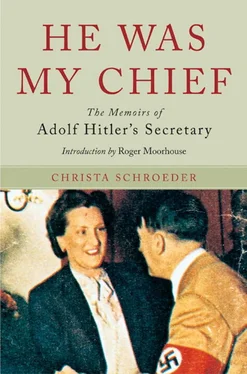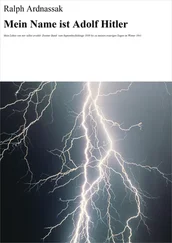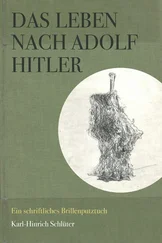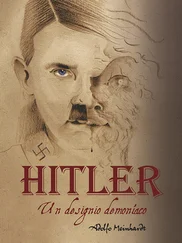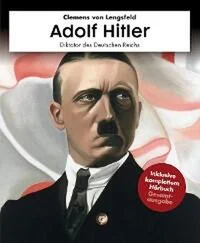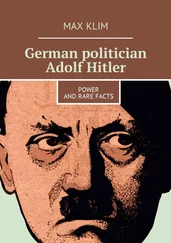Christa Schroeder - He Was My Chief - The Memoirs of Adolf Hitler's Secretary
Здесь есть возможность читать онлайн «Christa Schroeder - He Was My Chief - The Memoirs of Adolf Hitler's Secretary» весь текст электронной книги совершенно бесплатно (целиком полную версию без сокращений). В некоторых случаях можно слушать аудио, скачать через торрент в формате fb2 и присутствует краткое содержание. Город: Barnsley, Год выпуска: 2012, ISBN: 2012, Издательство: Frontline Books, Жанр: История, Биографии и Мемуары, на английском языке. Описание произведения, (предисловие) а так же отзывы посетителей доступны на портале библиотеки ЛибКат.
- Название:He Was My Chief: The Memoirs of Adolf Hitler's Secretary
- Автор:
- Издательство:Frontline Books
- Жанр:
- Год:2012
- Город:Barnsley
- ISBN:978-1-7830-3064-4
- Рейтинг книги:4 / 5. Голосов: 1
-
Избранное:Добавить в избранное
- Отзывы:
-
Ваша оценка:
- 80
- 1
- 2
- 3
- 4
- 5
He Was My Chief: The Memoirs of Adolf Hitler's Secretary: краткое содержание, описание и аннотация
Предлагаем к чтению аннотацию, описание, краткое содержание или предисловие (зависит от того, что написал сам автор книги «He Was My Chief: The Memoirs of Adolf Hitler's Secretary»). Если вы не нашли необходимую информацию о книге — напишите в комментариях, мы постараемся отыскать её.
He Was My Chief: The Memoirs of Adolf Hitler's Secretary — читать онлайн бесплатно полную книгу (весь текст) целиком
Ниже представлен текст книги, разбитый по страницам. Система сохранения места последней прочитанной страницы, позволяет с удобством читать онлайн бесплатно книгу «He Was My Chief: The Memoirs of Adolf Hitler's Secretary», без необходимости каждый раз заново искать на чём Вы остановились. Поставьте закладку, и сможете в любой момент перейти на страницу, на которой закончили чтение.
Интервал:
Закладка:
The beginning has been so promising. In the first two days at Wolfsschanze Dara and I even attended the military situation conferences when the improvised sessions took place in the mess. So we heard the boss, standing by a large map of Europe and pointing to Moscow, say: ‘In four weeks we will be in Moscow. Moscow will be razed to the ground.’
Letter, FHQ Wolfsschanze, 28 June 1941:
Yes, now I have wandered completely off the subject. Therefore in the morning we wait in Dining Room I until the boss, coming from the map room (where he will have received the situation report), arrives for breakfast which, by the way, consists of a cup of milk and a peeled apple. Easily satisfied and modest, isn’t he? We girls on the other hand cannot get enough and, after wolfing down our allotted portions (small pat of butter), deftly exchange the cutlery so that we get three portions instead of two. After that we let the boss explain the new situation to us and afterwards attend the general situation conference at 1300, which is held in the map room where reports are made by either Oberst Schmundt or Major Engel (army adjutant).
These reports are extraordinarily interesting. Statistics about the enemy aircraft and tanks destroyed are delivered (the Russians seem to have enormous masses, up to now they have lost over 3,500 aircraft and 1,000 tanks including heavy 40-tonners) and the progress of our troops is demonstrated on the map.
It is made clear how furiously the Russian fights; he could match us man for man if the Soviets had proper military planning which, thank God, is not the case. So, from the experience so far one can say that it is a struggle against wild beasts. If one asks how it is that we have taken so few prisoners, it is important to know that the Russian soldiers are stirred up by their commissars, who tell them atrocity stories about our ‘inhumanity’ which they will experience should they be taken prisoner. They are instructed to fight to the last and if overwhelmed to shoot themselves. That is how it plays out and the following happened at Kovno. A Russian prisoner sent by our troops to a bunker in order to ask the Russians there to surrender was probably shot by the commissar himself for having volunteered to carry the message. After that they blew themselves up. Better death than surrender.
Each unit is controlled by a GPU commissar to whom the commander is subordinate. Cut off from the leadership, what remains is a mob, totally primitive but which puts up a dour fight. This is naturally a danger in itself and leads to bitter fighting. The French, Belgians etc. were intelligent and gave up when they saw there was no point in going on, but the Russians keep fighting like madmen, trembling with fear lest something should happen to their families if they surrender◦– that is in any case what Moscow has threatened.
They cannot take advantage of having so many aircraft because they lack intelligence. In the Russian squadrons, for example, the squadron commander leads the way and the rest follow without knowing the objective, they simply stay on his tail. If he is shot down they cannot find the way back because most of them have not been trained to read a compass. Meanwhile◦– as I said previously◦– we have destroyed 3,500 Russian aircraft.
Back to the daily routine: at the end of the situation report the time passes slowly to lunch, which we take in Dining Room II. As the meal is very often stew we give that a miss particularly if peas and beans. If we have nothing important to do we take a nap for a couple of hours after lunch so that we are well rested for the remainder of the day, which usually lasts into the early hours.
Towards 1700 we are ordered to join the boss for coffee, and he treats us to cakes. Whoever eats the most gets a word of praise! The coffee hour usually lasts until 1900 but often longer. Then we go back to Dining Room II for dinner. After that we have a walk or see a film to kill time until we are invited for ‘tea’ after the evening situation conference.
In Hitler’s study, opposite the main windows, was a large fireplace with a round table before it and rattan chairs. As a rule at teatime the guests of the boss would be a medical doctor, one military and one personal adjutant, Martin Bormann, we two women and Heim, [68] Heinrich Heim (b.15.6.1900 Munich). 1920 NSDAP Membership No. 1222; from 1927 Munich lawyer; 1928◦– end 1930 attorney on staff of Hitler’s lawyer Hans Frank; 1933 staff of Rudolf Hess; various offices at NSDAP; 1940◦– end 1942 Martin Bormann’s adjutant at FHQ (absent 21.3.1942◦– 31.7.1942); 1943 to end April 1945 head of commission in Munich investigating basic questions of law for the reconstituted Europe; 3.5.1945◦– mid 1948 interned.
Bormann’s adjutant. Heim had been given the task to record ‘secretly’ the gist of Hitler’s talk after the tea session was over. These were first published subsequently under the title Adolf Hitler: Monologe im Führerhauptquartier 1941–1944 by Werner Jochmann.
Here I have to make some observations about Dr Henry Picker. [69] Henry Daniel Theodor Picker (b. 6.2.1912 Wilhelmshaven, d. 2.5.1988 Starnberg). NSDAP member from 1.4.1930; Hitler Youth Bannführer and Reichsamtleiter to 1.11.1944 when relieved of his post by Hitler and Bormann; deputised for Heinrich Heim at FHQ 21.3.1942◦– 31.7.1942, secretly noting Hitler’s table talks for Bormann. Picker claimed in his book (third edition, 1976) that he was ‘Hitler’s constant guest’ and that Hitler had approved his taking verbatim notes of Hitler’s conversations (p.28). Hermann Giesler: Nachtrag (Heitz & Höffkes Verlag, Düsseldorf 1988, pp.17–18) states however that ‘Picker’s place was at the adjutants’ table and not with the nightly tea guests.’
For a four-month period in 1942 Picker deputised for Heim as temporary adjutant to Martin Bormann at FHQ. On Bormann’s instructions but without Hitler’s knowledge, he had to make surreptitious notes of Hitler’s conversation to keep Bormann abreast of Hitler’s thinking. Whatever one may think, the Monologe [70] Werner Jochmann (ed.), Adolf Hitler: Monologe im Führerhauptquartiere 1941–1944: Aufzeichnungen Heinrich Heims , Verlag Albrecht Knaus, Hamburg 1980.
(Heim) and the Tischgespräche [71] Hitlers Tischgespräche , first published Athenäum Verlag, Bonn 1951, later edition with extensive commentary and notes by Picker, Seewald Verlag, Stuttgart 1976.
(Picker) are valuable sources for following Hitler’s thinking. Many historians have relied on them in the past, and many will in the future. What they may not know, however, is that a red line must be drawn through the Foreword and Commentary of Tischgespräche , for it is not true to claim that in 1942 Adolf Hitler gave Henry Picker the exclusive rights to write up the table talks. The facts are that Adolf Hitler had no knowledge of his monologues being secretly noted down. That he did not know, and did not wish a record to be kept, is proved by the following:
a. a conversation between Heim and Schaub after 1945. ‘In the spring of 1951 I met Julius Schaub in the street just after a magazine had published an extract from (Picker’s) Bonn book, which was on the point of being released. Schaub assured me that Hitler had had no idea that I was making notes…’; [72] 14.9.1953 for the BBC, London, taped recording, extract from Klüter-Blättern. Monatshefte für Kultur und Zeitgeschichte , Jahrgang 32, December 1981, Issue 12, p. 29.
b. a letter from Gerda Christian née Daranowski to Christa Schroeder dated 19 March 1975: ‘… you know how he (Hitler) hated having his thoughts committed to paper, i.e. he strictly forbade it. I remember one night at Wolfsschanze when after some highly interesting talk you said to him something like: “I would like to have got that down in shorthand” and he replied: “No, then I would not be able to speak so freely” etc. etc, do you remember?’
Читать дальшеИнтервал:
Закладка:
Похожие книги на «He Was My Chief: The Memoirs of Adolf Hitler's Secretary»
Представляем Вашему вниманию похожие книги на «He Was My Chief: The Memoirs of Adolf Hitler's Secretary» списком для выбора. Мы отобрали схожую по названию и смыслу литературу в надежде предоставить читателям больше вариантов отыскать новые, интересные, ещё непрочитанные произведения.
Обсуждение, отзывы о книге «He Was My Chief: The Memoirs of Adolf Hitler's Secretary» и просто собственные мнения читателей. Оставьте ваши комментарии, напишите, что Вы думаете о произведении, его смысле или главных героях. Укажите что конкретно понравилось, а что нет, и почему Вы так считаете.
